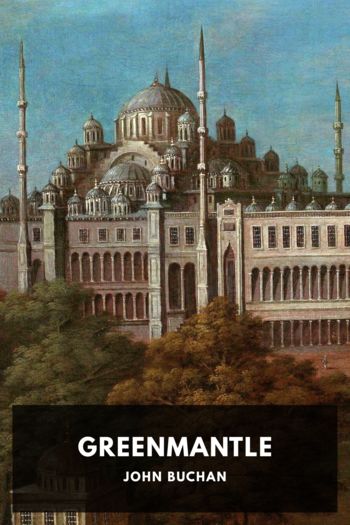Greenmantle - John Buchan (free ebook reader for iphone .TXT) 📗

- Author: John Buchan
Book online «Greenmantle - John Buchan (free ebook reader for iphone .TXT) 📗». Author John Buchan
Angora was like my notion of some place such as Amiens in the retreat from Mons. It was one mass of troops and transport—the neck of the bottle, for more arrived every hour, and the only outlet was the single eastern road. The town was pandemonium into which distracted German officers were trying to introduce some order. They didn’t worry much about us, for the heart of Anatolia wasn’t a likely hunting-ground for suspicious characters. We took our passport to the commandant, who visaed them readily, and told us he’d do his best to get us transport. We spent the night in a sort of hotel, where all four crowded into one little bedroom, and next morning I had my work cut out getting a motorcar. It took four hours, and the use of every great name in the Turkish Empire, to raise a dingy sort of Studebaker, and another two to get the petrol and spare tyres. As for a chauffeur, love or money couldn’t find him, and I was compelled to drive the thing myself.
We left just after midday and swung out into bare bleak downs patched with scrubby woodlands. There was no snow here, but a wind was blowing from the east which searched the marrow. Presently we climbed up into hills, and the road, though not badly engineered to begin with, grew as rough as the channel of a stream. No wonder, for the traffic was like what one saw on that awful stretch between Cassel and Ypres, and there were no gangs of Belgian roadmakers to mend it up. We found troops by the thousands striding along with their impassive Turkish faces, ox convoys, mule convoys, wagons drawn by sturdy little Anatolian horses, and, coming in the contrary direction, many shabby Red Crescent cars and wagons of the wounded. We had to crawl for hours on end, till we got past a block. Just before the darkening we seemed to outstrip the first press, and had a clear run for about ten miles over a low pass in the hills. I began to get anxious about the car, for it was a poor one at the best, and the road was guaranteed sooner or later to knock even a Rolls-Royce into scrap iron.
All the same it was glorious to be out in the open again. Peter’s face wore a new look, and he sniffed the bitter air like a stag. There floated up from little wayside camps the odour of wood-smoke and dung-fires. That, and the curious acrid winter smell of great windblown spaces, will always come to my memory as I think of that day. Every hour brought me peace of mind and resolution. I felt as I had felt when the battalion first marched from Aire towards the firing-line, a kind of keying-up and wild expectation. I’m not used to cities, and lounging about Constantinople had slackened my fibre. Now, as the sharp wind buffeted us, I felt braced to any kind of risk. We were on the great road to the east and the border hills, and soon we should stand upon the farthest battlefront of the war. This was no commonplace intelligence job. That was all over, and we were going into the firing-zone, going to take part in what might be the downfall of our enemies. I didn’t reflect that we were among those enemies, and would probably share their downfall if we were not shot earlier. The truth is, I had got out of the way of regarding the thing as a struggle between armies and nations. I hardly bothered to think where my sympathies lay. First and foremost it was a contest between the four of us and a crazy woman, and this personal antagonism made the strife of armies only a dimly-felt background.
We slept that night like logs on the floor of a dirty khan, and started next morning in a powder of snow. We were getting very high up now, and it was perishing cold. The Companion—his name sounded like Hussin—had travelled the road before and told me what the places were, but they conveyed nothing to me. All morning we wriggled through a big lot of troops, a brigade at least, who swung along at a great pace with a fine free stride that I don’t think I have ever seen bettered. I must say I took a fancy to the Turkish fighting man: I remembered the testimonial our fellows gave him as a clean fighter, and I felt very bitter that Germany should have lugged him into this dirty business. They halted for a meal, and we stopped, too, and lunched off some brown bread and dried figs and a flask of very sour wine. I had a few words with one of the officers who spoke a little German. He told me they were marching straight for Russia, since there had been a great Turkish victory in the Caucasus. “We have beaten the French and the British, and now it is Russia’s turn,” he said stolidly, as if repeating a lesson. But he added that he was mortally sick of war.
In the afternoon we cleared the column and had an open road for some hours. The land now had a tilt eastward, as if we were moving towards the valley of a great river. Soon we began to meet little parties of men coming from the





Comments (0)